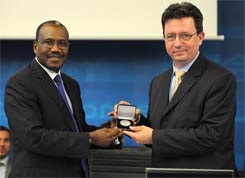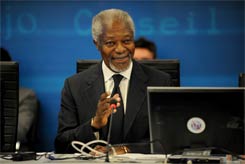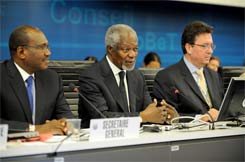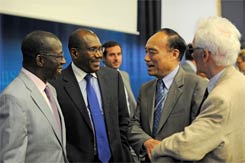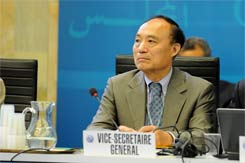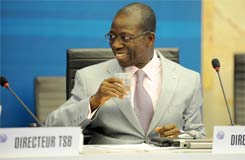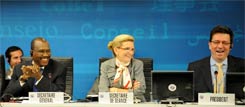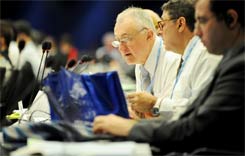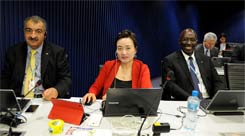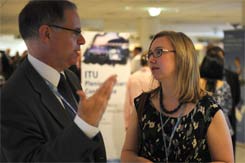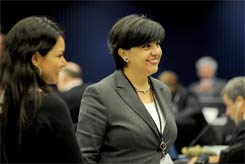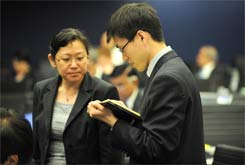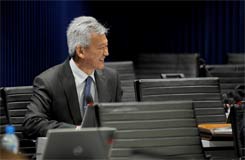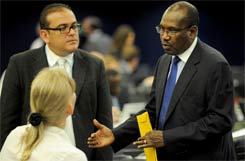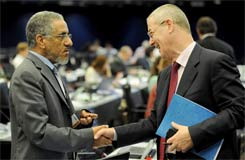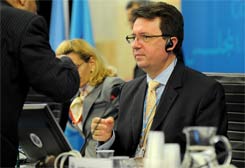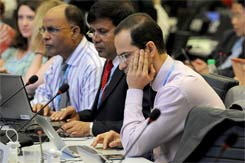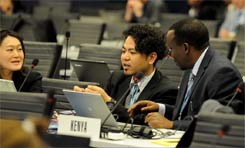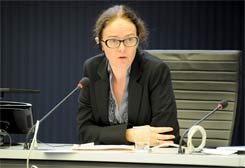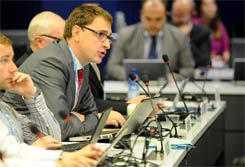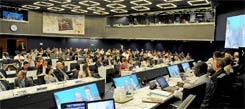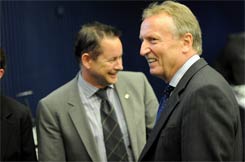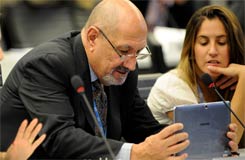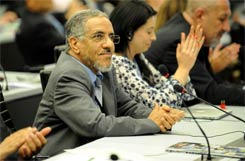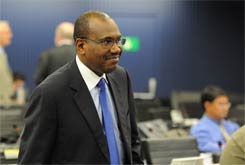
| « Previous | ||||||||||
|
|
||||||||||
| Issue No. 7 | Geneva, 19-20 June 2013 | |||||||||
|
|
||||||||||
Council takes landmark decisions for a better future for allDeveloping an information and communication technology framework for the common good |
||||||||||
|
The ITU
Council 2013
session, which
brought together
382 participants
representing the
48 Member States
of Council, 31
Member State
Observers, four
Sector Member
Observers, and
two Regional
Telecommunication
Organizations,
ended on
Thursday. From the landmark Accessibility Policy for Persons with Disabilities, the Gender Mainstreaming Policy, free online access to ITU-R Handbooks on radio-frequency spectrum management to the general public, to choosing Broadband for Sustainable Development as the theme for next year’s World Telecommunication and Information Society Day, the Council was certainly determined to help make our planet a better place for all. Chaired efficiently and expediently by Marius Cătălin Marinescu, President of the National Authority for Management and Regulation in Communications of Romania, the Council session ended one day ahead of schedule. The role of the Chairman of the Standing Committee on Administration and Management Caroline Greenway was also a key factor in ensuring that the matters at hand were addressed in a timely and efficient manner. Former United Nations Secretary-General, Kofi Annan, made a guest appearance at Thursday’s closing ceremony. After receiving a warm welcome, Mr Annan commended ITU's Beyond 2015 Global Youth Summit set to take place in San José, Costa Rica, next September, which will engage youth in defining ways towards ensuring that all people can benefit from ICTs in the framework of economic and social development. This double issue of the Highlights covering the decisions and proceedings of the final two days of the Council’s work concludes our coverage of Council 2013.
Council approves revised Resolution on ITU’s Role in the Overall Review of WSISThursday’s plenary session adopted revisions to Resolution 1334 (modified 2013) on the “ITU Role in the Overall Review of the Implementation of the Outcomes of the World Summit on the Information Society” (WSIS). Professor Vladimir Minkin of the Russian Federation, who chaired the drafting group on Resolution 1334, presented the revised version for discussion and approval. Mr Minkin also proposed that the next World Summit be held in the Russian resort town of Sochi in 2015. The Council noted with satisfaction that the WSIS Forum has proven to be an effective platform to assess progress and possible further advances in the implementation of WSIS outcomes. It also commended ITU’s efforts to ensure that in conjunction with the Regional Preparatory Meetings for the World Telecommunication Development Conference in 2014 (WTDC-14), six Regional Development Forums open to all WSIS stakeholders have been scheduled for 2013, to consider regional views on the implementation of WSIS outcomes, and a vision beyond 2015. It welcomed Egypt’s offer to host the WSIS+10 High Level Event in April 2014 in Sharm el-Sheikh and the commitment of Bahrain, Cambodia, Moldova, Serbia, Uruguay and Ghana to host these ITU Regional Development Forums. Following is a summary of some of the main additions or modifications to Resolution 1334 approved by the Council: The Council resolves
The Council instructs the Secretary-General
The Council instructs the Secretary-General and Bureaux Directors
The Council instructs the Working Group on the World Summit on the Information Society
The Council encourages Member States
The Council encourages the membership
Following the adoption of the changes to Resolution 1334, Sweden made a statement that was supported by the United States, Japan, Mexico, the United Kingdom and Canada. The Chairman of the Council Working Group on WSIS, Professor Minkin, convened an extraordinary meeting of the group on Thursday evening to follow up revised Resolution 1334.
ITU Secretary-General to consult stakeholders on international Internet public policyThe ITU Secretary-General informed the Council that he intends to carry out informal consultations with all stakeholders to gather their feedback on various Internet-related public policy issues. The Secretary-General noted that he would relay the essence of his discussions to the Working Group on International Internet-related Public Policy Issues. He stressed that in his consultations, he would be especially mindful of the involvement of stakeholders from developing and least developed countries. These consultations would be held without any financial implications for the Union or any change in the procedures of the Council Working Group on the Internet. Delegates recognized that the Secretary-General can carry out or facilitate any informal consultations with stakeholders. The Secretary-General also has the right to submit the outcome of his discussions as an information document in a timely manner to Council working groups, including the group on International Internet-related Public Policy issues.
ITU seeks greater recognition of the role of ICTs on behalf of persons with disabilitiesThe ITU today highlighted its key role in striving to ensure that the world’s one billion persons with disabilities benefit from information and communication technologies in social and economic development frameworks. In a communiqué presented by Mexico at Thursday’s plenary session, the ITU invited delegations participating in the United Nations High Level Meeting on Disabilities and Development (HLMDD) to acknowledge the key role that ICTs are already playing to promote the social and economic inclusion of persons with disabilities. Councillors strongly supported the communiqué which requested the delegations participating in HLMDD to consider including specific recommendations to further expand access to ICTs to persons with disabilities in their outcome document. The communiqué noted that the HLMDD presents an excellent occasion for the UN system to work together towards the achievement of the UN common goal, namely inclusive development and a society in which persons with disabilities are both agents and beneficiaries. It underlined that ITU, in accordance with Resolution 175 from the ITU Plenipotentiary Conference (Guadalajara, 2010), is committed to promoting access to ICTs to persons with disabilities and has already mobilized its membership as well as other relevant stakeholders to that end. ICTs have increasingly become a positive force of transformation and a crucial element of any institutional framework for inclusive development, and can provide access to key public services, such as health, education and government services, with widespread implications on social, environmental and economic progress aimed at eradicating poverty and promoting sustainable development. The communiqué appealed to all concerned to “work together to achieve a disability-inclusive development agenda using all the opportunities currently available, including the transformational power of ICTs”. It will be circulated to all HLMDD participants and to ITU Member States.
Council discusses potential ITU supervisory role over future space assets registration systemThe Secretary-General was instructed at Thursday’s Council session to continue to express interest in ITU becoming the Supervisory Authority, upon or after the entry into force of the Protocol, and to maintain his or his representatives’ participation in the work of the Preparatory Commission as an observer. The Council had previously sought clarification from the Secretary-General regarding the implications of ITU taking on the role of the Supervisory Authority, including its impact on the rights of Member States and Sector Members. The Council furthermore instructed the Secretary-General to submit to Council 2014 and the next Plenipotentiary Conference a report on the outcomes of the Preparatory Commission and the financial, juridical and technical implications of the ITU taking on the Supervisory Authority role, taking into account developments of the Preparatory Commission up to that time and addressing the clarifications sought by Council on this matter. It also requested the Secretary-General to report on the financial implications of its participation in Preparatory Commission meetings and the financial implications should ITU take on the Supervisory Authority role upon or after the entry into force of the Protocol. Finally, the Secretary-General was requested to identify mechanisms by which ITU Member States and Sector Members can review or provide comment on the ITU’s role as the Supervisory Authority.
Council notes the outcomes of the Global Standards Symposium and World Telecommunication Standardization AssemblyThe Council noted with satisfaction the reports on the Global Standards Symposium (GSS) and the World Telecommunication Standardization Assembly, which took place in Dubai (United Arab Emirates) on 19 November 2012 and 20-29 November 2012, respectively. Presenting the reports, Reinhard Scholl, Deputy to the Director of TSB, underlined that GSS addressed particular challenges resulting from the convergence and integration of ICTs into all sectors and industries. According to Mr Scholl: “Firstly, with convergence, the traditional demarcation between the work of different standards bodies is becoming blurred, and there is an increasing risk of overlap and duplication. Secondly, ICT standardization is no longer limited to the confines of the ICT industry, but must now work with other industry sectors to develop new global standards for new services. For example, successful standards for intelligent transport systems need the participation of the automobile manufacturers, those for e-health the healthcare industry, those for mobile money the banks, and those for smart grids the utilities.” WTSA Resolution 44 invites the Council to encourage the establishment of a specialized panel to stimulate ICT innovationsWTSA-12 approved the mandates of the ten ITU-T study groups. Four study group chairmen and more than 50 new vice-chairmen from 35 countries, including 24 from developing countries, were appointed. WTSA-12 also updated Resolution 44 on “Bridging the Standardization Gap”. The Assembly expressed strong support for ITU-T’s programme in this area. Mr Scholl highlighted two points that required the attention of the Council: WTSA Resolution 44 “invites the Council to encourage the establishment of a specialized panel for stimulating ICT innovations, under ITU-T, with the objective of enhancing global collaborative innovation in order to bridge the standardization gap between developed and developing countries and to identify and support innovations from developing countries”. In 2012, the Telecommunication Standardization Advisory Group (TSAG) established a Focus Group “Bridging the gap: from innovations to standards” with the objective of identifying successful cases of ICT innovations in developing countries and examining their potential for standardization. The Focus Group has so far identified some 200 ICT innovations originating from developing countries and is analysing them to identify potential new standardization work. However, the lifetime of a focus group is limited – normally one year – which is why WTSA proposed this ICT innovation panel. Resolution 44 also invites the Council to report on this matter to the Plenipotentiary Conference. Council is therefore invited to encourage the establishment of this panel; the panel would continue the work of the focus group once it completes its term (mid-2014). WTSA Resolution 34 calling for voluntary contributionsThe second point is to draw the Council’s attention to WTSA Resolution 34 calling for voluntary contributions, whether in kind or monetary, that can be used to fund specific projects, fellowships, or new initiatives, including any activities that help achieve the objectives of Resolution 44. Noting these points, the Council encouraged the membership to support the implementation of Resolution 44. TSB Director Malcolm Johnson commented: “WTSA-12 has given ITU-T an ambitious mandate, but we do not currently have the necessary resource to fully implement it. We will be dependent on voluntary contributions, and so I am pleased that Council has encouraged membership to support Resolution 34 which calls for voluntary contributions, and also Resolution 44 on bridging the standards gap. Voluntary contributions could help us implement the new activities on e-waste, software-defined networks, smart water, innovation panel, e-health, or the action plan in Resolution 44. In particular we need funds for fellowships to enable least developed countries to participate in our work. “We are making every effort to increase translation in ITU-T; for example we are trialling outsourcing to our academia members, and using automatic translation software. The cost of translating one page in Geneva is approximately CHF 180 per language, which means CHF 900 per page into the 5 other languages. However, for the trial, universities are willing to translate for about CHF 20 per page per language so this could enable us to substantially increase the amount of translation we can afford.”
Council notes outcome of World Conference on International TelecommunicationsThe World Conference on International Telecommunications (WCIT-12) was held in Dubai from 3 to 14 December 2012. The Council noted the report on the outcome of WCIT-12, which revised the International Telecommunication Regulations (ITRs) in their entirety and adopted five new resolutions. The Final Acts were signed by 89 Member States out of 144 present and accredited to sign. Councillors were informed that two additional countries were in the process of acceding to the Final Acts of WCIT-12. Member States are in different stages of the accession process. As they complete it and notify the ITU secretariat, the website will be updated accordingly. Considering that the ITRs constitute an open treaty, any Member State which has not signed can still accede to it in the future, by way of a unilateral act by the Member State. The model instrument of accession is available on the ITU website. It should be borne in mind that Member States can make Declarations for the purpose of specifying or clarifying the meaning of a provision of the treaty at the time of deposit of the instrument of accession. Some Councillors encouraged ITU to continue its efforts to get more countries on board.
Kuwait Minister calls for global information infrastructure to mitigate disaster impactsThe Kuwaiti Minister of Communications, Salim Alozainah, has called for the creation of a global information infrastructure to help prevent and mitigate the impacts of natural and man-made disasters. Speaking at Wednesday’s Council plenary session, the Minister urged the ITU to give priority to linking all communication networks in the world in order to establish an inter-connected global information system that could be used to prevent disasters and reduce their human and financial consequences. Mr Alozainah praised the work of the ITU in serving “the interests of peoples and States of the world and the objectives of communication and cooperation towards world peace and development”. “It goes without saying that ITU offers valuable services to humankind in all areas of ICTs,” he said. In reaffirming Kuwait’s support to the ITU, the Minister said: “We are fully aware of the important role played by ICTs in improving the lives of individuals and peoples of the world, as well as in paving the way for a sustainable development and increasing our capability to compete and fully take part in the civilization of the 21st century.” The Minister described some of Kuwait’s achievements in developing and modernizing its ICT infrastructure through an inclusive approach with special focus on enhancing the capacities of women, youth, and people with special needs. Kuwait, he added, was doing its utmost to enhance the ICT skills of its population at large and has embarked on a number of projects to modernize its ICT infrastructure, including the development of terrestrial and submarine fibre-optic networks. It has also introduced the use of Internet throughout the education system as well as projects benefiting persons with special needs.
ITU Telecom World 2013 preparations on trackThe Council was informed that ITU Telecom World 2012, held in Dubai (United Arab Emirates), had been a success and that plans were on track for Thailand to host the 2013 edition in Bangkok next November. He said the 2012 edition had made a profit despite the economic and financial crises and that he was confident that Telecom World 2013 would be a success. Thailand said it welcomed the opportunity to host the “best ever” Telecom World event.
Connect the World InitiativeThe Council noted the report presented by the secretariat on the Connect the World Initiative launched in 2005 to help mobilize partners and resources needed to implement WTDC and WSIS outcomes. The report recalled that, to this end, a series of regional summits has been organized to bring together committed stakeholders to strengthen existing and launch new partnership initiatives for ICT investment. The first in the series, Connect Africa, took place in Kigali, Rwanda in October 2007 followed by Connect CIS in November in Minsk, Belarus, Connect Arab States held in March 2012 in Doha, Qatar and Connect Americas which took place in July 2012 in Panama City. ITU plans to organize the Connect Asia and the Pacific Summit in November 2013 in Bangkok, Thailand, in conjunction with TELECOM World 2013. Negotiations are on-going with the host country.
Preparations on track for the 2015 Radiocommunication Assembly (RA-15) and the World Radiocommunication Conference (WRC-15)The Council noted with satisfaction a progress report on preparations for RA-15 and WRC-15, in accordance with Council Resolution 1343 that established the place and date for both events, and the agenda for WRC-15. Following
consultations
with ITU Member
States, it has
been decided
that both the The report also noted that good progress has been made on preparations for the regional telecommunication organizations, including CEPT, CITEL, APT, RCC, and the Arab Group of countries and the African Group of countries through ASMG and ATU, respectively. The planned organization of three ITU Inter-regional Workshops on WRC-15 Preparation, with the first one scheduled on 4-5 December 2013, should also be noted.
Preparations get under way for ITU strategic and financial plans for 2016-2019The Council adopted a report outlining the main results of the first meeting of the Council Working Group for the elaboration of the draft Strategic Plan and Financial Plan of the Union for 2016-2019 (CWG-SPFP), in accordance with its Resolution 1358. The CWG held its first meeting under the chairmanship of Mario Canazza (Brazil) at ITU headquarters on 18 June 2013. Some delegations requested interpretation services for all official languages of the Union, since it would be necessary to have a clear understanding of the relevant issues being discussed. It was clarified that, due to budgetary implications, the secretariat will provide translation of documents into other languages, but not interpretation. It was suggested that: the Strategic Plan could include ITU-wide Mission, Vision and Goals, as well as strategic risks and targets; and separate objectives for the Sectors and the General Secretariat. The outputs (separate for each Sector and the General Secretariat) as well as the key performance indicators, expected results, risks and processes could be included in the operational plans.
Council approves budget based on zero nominal growthThe 2014-2015 budget approved by the Council is based on zero nominal growth applied since 2006 and fixed Member States’ contributory units at CHF 318,000. The total budget amounts to CHF 331.055 million broken down as follows:
Mandatory retirement age of ITU staff: 60, 62 or 65The Council approved a decision to raise the mandatory retirement age for new ITU staff from 62 to 65 years of age. This decision was taken in Thursday’s plenary, following a recommendation from the Standing Committee on Administration and Management (ADM). The mandatory age of retirement and separation has been a long-standing question across the United Nations Common System. In December 2012, the United Nations General Assembly (UNGA) authorized, in its Resolution 67/240, the UN Joint Staff Pension Board to increase the mandatory age of retirement for new participants in the Pension Fund from 62 to 65 years of age. Council’s decision will enter into force on 1 January 2014, provided that the corresponding amendments to the Statutes of the United Nations Joint Staff Pension Fund have become effective under the provisions of UNGA Resolution 67/240 by or prior to that date. It will apply to staff recruited on and after 1 January 2014. The decision urges the Secretary-General “to limit, to the extent possible, any exceptional extensions beyond retirement age to a maximum two-year period past that which is established for the staff member concerned, and in accordance with Staff Regulation 9.9.” It was noted that any such extension would be taken by the Secretary-General solely in the interest of the Union upon solid justification, and not for individual reasons. Staff Regulation 9.9 has been amended accordingly, and stipulates: “Staff members shall not be retained in active service beyond the age of 60 years; or 62 years, if appointed on or after 1 January 1990; or 65 years, if appointed on or after 1 January 2014.”
Statement by the Staff CouncilAnna Khristich, Chairman of the Staff Council, made a statement during ADM on Wednesday thanking members of the previous Staff Council for their dedication and success “in bringing ITU management and staff closer together”. Ms Khristich said the present Staff Council was “determined to maintain their hard work and commitment” and would continue to pursue a course of collaborative dialogue and to engage in a proactive approach to staff-related issues. As she put
it: “To sustain
our relevance in
a fast moving,
challenging and
competitive
world, we
recognize that
success relies
on sustainable
ethical
leadership -
built on trust,
honour,
collaboration
and transparency
between all
stakeholders…We
will work hard
to ensure that
such challenges
are met
ethically,
equitably and
justifiably.” The full text of her statement is available at http://www.itu.int/council/C2013/pd/statement-staff-council.docx.
Changes to Decision 563 on the Council Working Group on Financial and Human ResourcesWednesday’s ADM discussions led to the approval in Thursday’s plenary of changes to Decision 563 on the Council Working Group on Financial and Human Resources. Several councillors had requested the secretariat to clarify the policy on making ITU documents available to the public. The secretariat had responded that some documents, such as Memoranda of Understanding (MoUs), may contain confidential clauses that restrict their distribution to parties other than the signatories. The Secretary-General, Dr Hamadoun I. Touré, had emphasized that caution must be exercised to avoid politicizing ITU issues by some civil societies whose objectives may not always be in the best interest of the Union. Based on these, and on other comments, Bruce Gracie, Chairman of the Council Working Group on Financial and Human Resources, had been requested by ADM to revise Decision 563. The revisions were first agreed in ADM and then in plenary. In particular, the group’s terms of reference have been amended to allow it to ensure that:
The group will review the document access policy in ITU to determine the extent to which documentation should be made publicly accessible. It will consider criteria to determine the financial and strategic implications of the establishment of Memoranda of Understanding (as well as Memoranda of Cooperation and Agreement) to which ITU is, or will be, party.
Current methodologies for the participation of Sector Members, Associates and Academia to be studiedThe resolution on the “Study of the current methodologies for the participation of Sector Members, Associates and Academia” instructs the Council Working Group on Financial and Human Resources to develop detailed recommendations on a full range of issues affecting and enhancing the future participation of these member categories in the work of the Union, including alternate membership categories and options related to such issues as fee structure. The group’s recommendations would be considered by Council 2014. During the discussion in ADM, Dr Gracie noted that the fee structure and categories were complicated and difficult to explain, and highlighted the need to review them. He also noted the need to avoid incremental changes that could add further complexity, and instead to adopt guiding principles to help the ITU secretariat develop more detailed proposals to improve the fee structure, including through simplifying, enhancing fairness and consistency, and modernizing the structure to address current needs. ADM supported the Chairman’s report and approved the resolution, with amendments made to emphasize the objective of attracting and retaining Sector Members, Associates and Academia. Editorial changes were also made to improve the Arabic version. On Thursday, the Council approved the resolution as revised and endorsed in ADM.
Secretary-General’s closing remarksIn his closing remarks ITU Secretary-General, Dr Hamadoun I. Touré, commended the Council chairmanship of Marius Cătălin Marinescu from Romania “who has not only led the Council to a successful conclusion, but has done so ahead of schedule. This is a tremendous achievement in any circumstances – and it is a record achievement at a Council session dealing with the budget.” Dr Touré then presented the Chairman with the ITU Silver Medal for his “outstanding service to the Union”. The Secretary-General noted that 12 plenary and 7 Standing Committee on Administration and Management meetings had been held without the need for weekend or night sessions, or even votes, while 87 input documents were reviewed, including 28 contributions from Member States, and 19 formal texts adopted. “This Council was an excellent demonstration of how we continue to build on our long and honourable history of working together, to facilitate technical and technological progress, with trust and faith in one another. We have been true to the spirit of the Union, to the spirit that brings us together here for the common good, with our shared goals and shared aspirations,” he added.
Date and duration of the 2014 session of the CouncilThe Council will hold its next ordinary session from 6 to 15 May 2014 in Geneva for a period of 8 working days. The Council
also decided to
propose to the
next
Plenipotentiary
Conference to
improve
implementation
of Resolution
153 by
scheduling the
Council sessions
on a four-year
basis.
|
|
|||||||||
